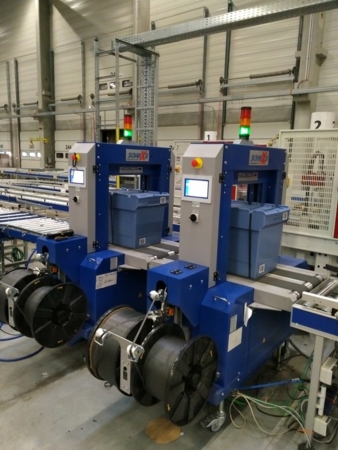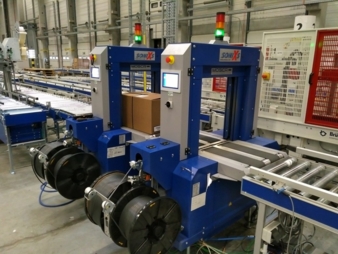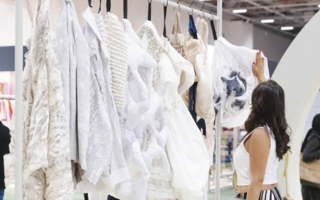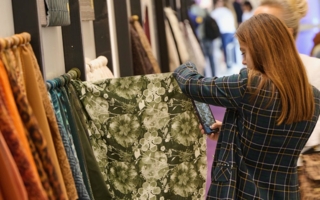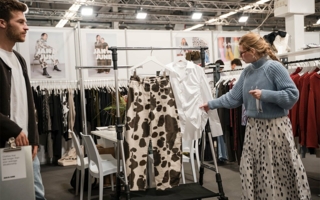08/06/2018 – Mosca — auf Deutsch lesen
Strapping for the clothing industry
Mosca strapping machines are attractive to clothing sector customers because of their speed and flexibility - a user report.
The main warehouse is the hub of activity of any international clothing company. Takko Fashion is no exception. Overnight, 1,900 outlets in 16 different countries reorder clothing items. To satisfy this demand, up to 3,000 packages and boxes leave the warehouse every hour. The contents must be safely protected on the way to their destination. Takko Fashion recently partnered with Mosca GmbH, manufacturer of the Evolution SoniXs TR-6 Pro – a strapping machine that perfectly meets the company's demands for maximum performance.
Thomas Kröger, Head of Logistics at the Winsen/Luhe Warehouse coordinates three main lines along with an auxiliary machine that is deployed during peak times. If one of these machines fails, the entire supply process comes to a halt. In the past, Takko Fashion used a complicated process in which they had to glue and strap packages to achieve the necessary stability for transport. In early 2017, the company started searching for a new solution to ensure safe transport of goods. The aim was to quickly and reliably secure parcels and boxes of similar dimensions for transport.
In search of the best transport protection
The clothing company tested several different options in its search for the best packaging solution. These included gluing the cartons and securing the strapping material with seals. But this approach was less than ideal: The seals often became detached during transport, and the glued cartons were not stable enough for long-distance transport. Thomas Kröger visited the Logimat intralogistics trade fair in March to learn more about the options for transporting goods. This is where he met Mosca GmbH representatives, who were showcasing a comprehensive portfolio of strapping machines and materials in Stuttgart. Mosca’s strapping technology which uses plastic straps to secure packages convinced him from the start. The machines’ high strapping speed spoke to Takko Fashion’s need to operate faster. The SoniXs ultrasonic technology developed by Mosca offers real advantages when it comes to handling sensitive textiles. Unlike conventional heat welding, there are no vapors or smells caused by heating the strapping material.
Strapping put to the test
Mosca responded quickly to the company's interest. There was a machine used for training purposes at the Mosca service center in Hanover that met Takko Fashion’s need for double strapping. It was installed in Winsen and ready for testing within one week after initial contact. During a three-week test phase, the Mosca Evolution SoniXs MP-6 B machine convinced the customer with its high processing speed, easy operation, and strap sealing strength capable of protecting the contents of the parcels and boxes. Working in close cooperation with Takko Fashion, Mosca developed a custom solution for the logistics center using an EVOLUTION SoniXs TR-6 Pro strapping machine. The EvolutionSoniXs TR-6 Pro straps the packages so reliably and firmly that Takko Fashion no longer has to glue the boxes. This not only enabled the company to speed up packaging operations, it also saves material and lowers costs. The people working in the Takko Fashion warehouse also liked the option of remote diagnosis for any potential problems with the machine.
Sought and Found: The perfect solution
Within four weeks after initial contact with the Mosca sales team, the company headquarters in Waldbrunn received an order for two machines. Takko Fashion opted for the Evolution SoniXs TR-6 Pro model to handle their high throughput. The company was also convinced by the machine's double strap dispenser. The ability to load the system with two strap coils eliminates the need to halt operations when it's time to change the strap. A sensor detects when one of the coils is empty and automatically switches to the full coil. This effectively minimizes system downtime.
Boxes and parcels are strapped twice at Takko Fashion. Two machines are used in succession on a line. Each machine only straps once, which increases processing speed. The tandem version of the EVOLUTION SoniXs TR-6 Pro used by Takko Fashion is equipped with an automatic change-over function. If an unexpected problem occurs, the machine automatically switches to pass-through mode and the second machine straps the package twice. This keeps production running continuously until the problem is resolved. Together with the double strap dispenser, the automatic change-over function ensures maximum throughput of reliably strapped packages.
Low maintenance costs and the option of using the same machine for varying package dimensions also played a decisive role. Since Takko Fashion ships to different European countries, the company's in-house logistics use eco-friendly returnable boxes along with conventional cartons. In some countries, returning the empty boxes is too complicated because of the customs charges and other factors. That's why Takko Fashion will continue to use both formats and therefore needs a machine that can handle them.
A cooperation with a bright future
The first two Mosca machines have been in operation in Winsen since May 2017. Thomas Kröger is satisfied. He reports that the machines have been meeting his expectations from the very beginning. Takko Fashion employees appreciate the fact that they are easy to operate. And since they are the ones using the Evolution SoniXs TR-6 Pro every day, this is seen as an important criterion. Excellent teamwork with Mosca also played a role in Takko Fashion ordering additional machines while the first order was still being processed.
by Rainer Zinn

